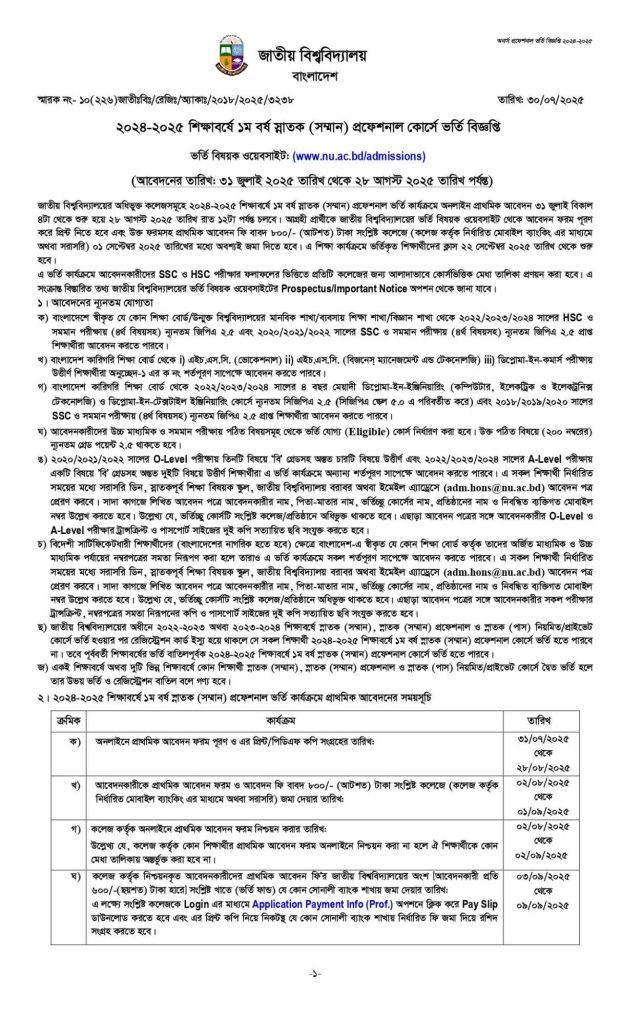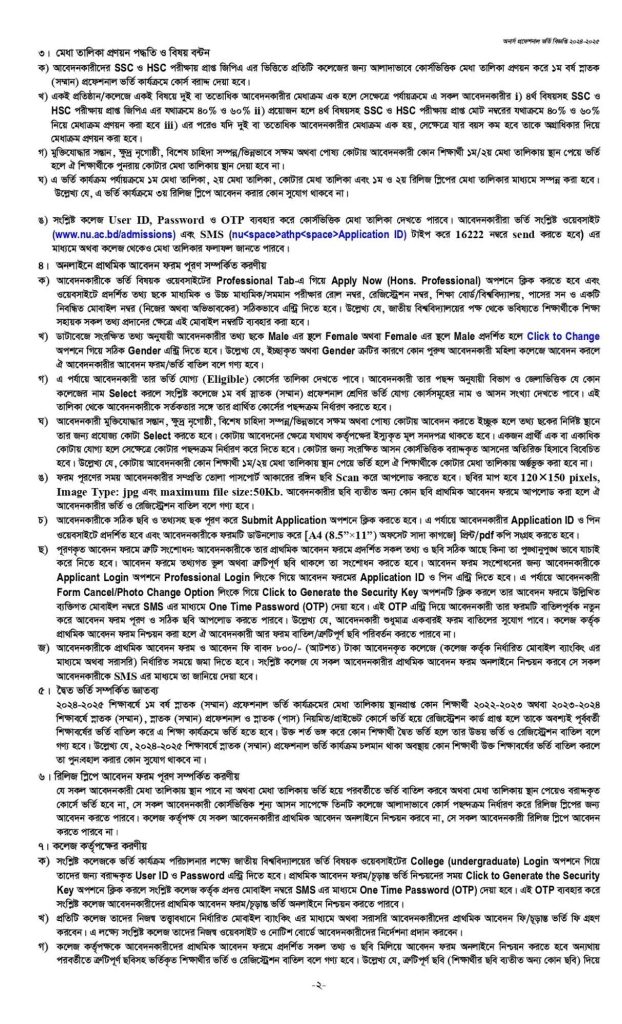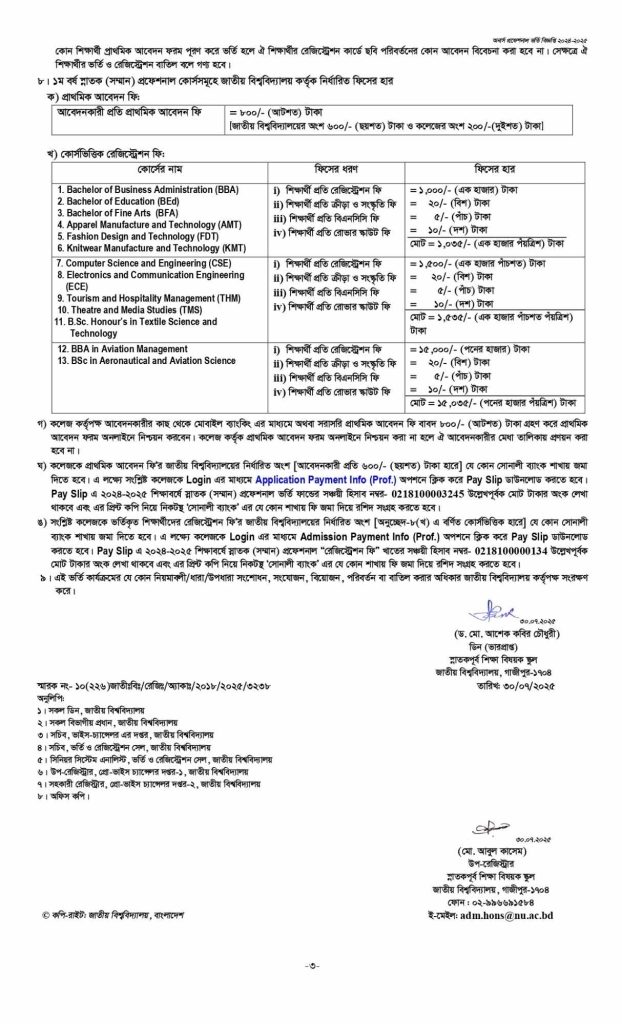Hey everyone! Your friendly neighbourhood senior is back. So, the HSC results are out, the initial celebration (or commiseration, we’ve all been there) is over, and now the real para begins: university admission. It’s that chaotic, confusing, yet exciting time of life. And if you’re reading this, chances are you’re eyeing a spot in one of the National University’s NU Honours Professional Admission courses.
Good choice! But I bet you have a million questions. What’s the difference between this and regular Honours? Am I even eligible? How on earth do I navigate that application website without pulling my hair out?
Relax, take a deep breath, and maybe grab a cup of cha. I’ve got you. This guide is your one-stop-shop for everything related to the NU Honours Professional Admission 2024-2025. Let’s break it down, step-by-step, with no confusing jargon. Promise.
NU Honours Professional Admission at a Glance (Quick Summary)
For those of you who just want the fast-track info, here’s the gist of it. Think of this as the trailer before the main movie.
- University Name: National University (NU), Bangladesh
- Course Name: Honours Professional (4-Year Undergraduate Degree)
- Admission Basis: No admission test! Your selection is based purely on your SSC and HSC (or equivalent) GPA.
- Application Website: app1.nu.edu.bd
- Application Fee: BDT 800 (usually, but always check the official circular!)
- Payment Method: Mobile Banking (bKash, Nagad, Rocket, etc.)
Important Dates: Application Start, End, and Merit List
Alright, this is the part you absolutely cannot mess up. Mark these on your calendar, set a reminder on your phone, write it on your wall if you have to! Please note that these are tentative dates based on previous years. Always, and I mean ALWAYS, cross-check with the official admission circular on the NU website (www.nu.ac.bd) once it’s published.
- Online Application Start Date: Expected in late May or early June 2024
- Online Application End Date: Expected in late June or early July 2024
- Application Fee Submission Deadline: A day or two after the application ends.
- 1st Merit List Publication: Expected in mid-to-late July 2024
- 2nd Merit List Publication: Expected in early August 2024
- Release Slip Application: Usually starts after the merit list admissions are complete, around mid-August 2024.
Don’t be that person who misses the deadline. Seriously. Don’t.
What This Guide Covers
We’re going deep. From understanding what a professional degree even is to navigating the final admission hurdles. We’ll cover:
- The A-Z of NU Honours Professional courses.
- Eligibility criteria in plain English.
- A foolproof, step-by-step application guide.
- Lists of popular courses and colleges.
- What happens after you submit your application (merit lists, migration, and the famous release slip).
- Answering your most burning questions.
Ready? Let’s get started. Here you can also check how to fill up form for 1st Year Honours.
What is National University (NU) Honours Professional?
This is probably the first question on your mind. You see “Honours (Professional)” and “Honours (Regular)” and your brain just goes… what? It’s a valid confusion!
Think of it like this: Regular Honours is more theory-focused, academic, and research-oriented. It gives you a broad and deep understanding of a subject, like Bangla, History, or Physics. It’s fantastic for careers in academia, research, or civil service (like BCS).
Honours Professional, on the other hand, is all about job-readiness. These courses are designed with the current job market in mind. They are practical, skill-based, and career-oriented from day one. You’re not just learning the theory; you’re learning the application of that theory in a professional setting.
Key Differences: Professional vs. Regular Honours Courses
| Feature | Honours Professional | Honours (Regular) |
|---|---|---|
| Focus | Job-oriented, practical skills, industry-specific. | Theory-oriented, academic, research-focused. |
| Curriculum | Modern, frequently updated to match job market demands. | Traditional, broad-based curriculum. |
| Example Subjects | BBA, CSE, Fashion Design, Tourism & Hospitality. | Bangla, History, Physics, Mathematics, Political Science. |
| Career Path | Direct entry into corporate jobs, tech industry, creative fields. | Academia, research, government services (BCS), teaching. |
| Internship | Often a mandatory and crucial part of the curriculum. | Less common, depends on the specific department. |
| Availability | Offered in a limited number of affiliated colleges. | Widely available in most government and non-gov colleges. |
Career Advantages of a Professional Degree
So, why should you care? Because a professional degree can give you a real head start.
- Higher Employability: These degrees are literally designed to get you a job. The curriculum for Computer Science and Engineering (CSE), for example, is built around the programming languages and technologies companies are actually using.
- Specialized Skills: You graduate with a specific skillset. A degree in Apparel Manufacturing Technology (AMT) doesn’t just teach you about textiles; it teaches you how to manage a production line in a garments factory. That’s a valuable, specific skill.
- Industry Connections: Because these courses are industry-focused, they often involve guest lectures from professionals, industry visits, and mandatory internships. This is your chance to network and see how things really work before you even graduate.
I think if you’re someone who wants to jump straight into a specific career path after graduation – be it in business, tech, or design – a professional course is an incredible option.
Detailed Eligibility Criteria for NU Honours Professional Admission 2024-25
Okay, let’s get down to the nitty-gritty. Who can apply? Here are the rules of the game. Pay close attention!
Academic Requirements: SSC & HSC Passing Year
This is the first filter. To be eligible for the NU Honours Professional Admission 2024-2025 session, you need to have passed:
- SSC or equivalent: in 2021 or 2022
- HSC or equivalent: in 2023 or 2024
If your passing years don’t match these, unfortunately, you won’t be able to apply for this session.
Minimum GPA for Science, Arts, and Commerce Students
This is where your hard work in school pays off. The minimum GPA requirements vary based on your group and the type of course you’re applying for.
For BBA, CSE, ECE courses:
- Science & Commerce Students: You need a minimum GPA of 3.0 in both SSC and HSC (including the 4th subject) and a combined GPA of at least 6.5.
- Arts Students: You need a minimum GPA of 3.0 in both SSC and HSC (including the 4th subject) and a combined GPA of at least 6.0.
For All Other Professional Courses (FDT, AMT, KMT, etc.):
- Science, Arts & Commerce Students: You need a minimum GPA of 2.5 in both SSC and HSC (including the 4th subject) and a combined GPA of at least 6.0.
Always double-check the official circular for any minor changes, but these have been the standard requirements for a while.
How Your Merit Score is Calculated (No Admission Test)
This is the golden question, isn’t it? Since there’s no stressful admission test, your entire future at NU depends on a simple mathematical formula. Here’s how they calculate your merit score:
- Your HSC GPA (with 4th subject) is multiplied by 60% (or 0.6).
- Your SSC GPA (with 4th subject) is multiplied by 40% (or 0.4).
- The two results are added together to get your final merit score (out of 10).
Formula: Merit Score = (HSC GPA × 0.6) + (SSC GPA × 0.4)
Example:
Let’s say you got a GPA of 5.0 in HSC and a GPA of 5.0 in SSC.
* HSC part: 5.0 × 0.6 = 3.0
* SSC part: 5.0 × 0.4 = 2.0
* Your Merit Score = 3.0 + 2.0 = 5.0 (This is a simplified example; the actual score is calculated out of 100 on the backend, but the weighting is what matters).
If two students have the same merit score, they will be ranked based on their HSC GPA, then SSC GPA, and finally, their age (the younger student gets priority).
Step-by-Step Online Application Guide (app1.nu.edu.bd)
Alright, deep breaths. The online application can seem intimidating, but it’s actually quite straightforward if you follow the steps. Let’s do this together.

Step 1: Accessing the Admission Website
Your journey begins at the official NU admission portal. Open your browser and go to: http://app1.nu.edu.bd/
On the homepage, you’ll see several options for different courses (Regular Honours, Degree, Masters, etc.). Look for the section or tab that says “Honours Professional” and click on the “Apply Now” button.

Step 2: Filling the Application Form with Your Academic Information
This is the easiest part. You’ll be asked to enter your SSC and HSC roll numbers, registration numbers, board, and passing year.
Once you enter this information and click “Next,” the system will automatically fetch your name, parents’ names, and GPA from the education board’s database. Magic!
Check carefully to make sure all the auto-filled information is 100% correct. If there’s a mistake, you’ll need to contact the education board, but this is very rare.

Step 3: Choosing Your College and Subject Priority List
This is where you need to be strategic. You’ll first select the Division and District where your desired college is located. Then, a list of eligible colleges offering professional courses will appear.
- Select your desired college.
- Choose your subjects in order of preference. The subject you want the most should be #1 on your list. The one you want second-most should be #2, and so on.
My advice? Be realistic. Research the colleges and their minimum required merit scores from previous years if you can. Your first choice should be your dream subject at your dream college, but your subsequent choices should be safe bets.
Step 4: Uploading Your Photo (Correct Dimensions & Instructions)
Ah, the dreaded photo upload. This is where so many students get stuck. Don’t worry, it’s simple if you follow the rules.
- Dimensions: The photo must be 120 pixels wide by 150 pixels high.
- Format: It must be a JPG or JPEG file.
- File Size: The size should not exceed 50 KB.
- Appearance: It should be a recent, passport-style photo with a clear background. No selfies with a Snapchat filter, please!
How to resize your photo: You can use online tools like picresize.com or even simple software like MS Paint on Windows. Just be sure to set the dimensions and save it with a low file size.
Step 5: Reviewing and Submitting Your Application
This is your final chance to check everything. Read through your chosen college, your subject priority list, your personal information, and look at the uploaded photo. Is everything correct? If yes, tick the declaration box and click the “Submit Application” button.
Once you submit, you’ll be given an Admission Roll Number and a PIN. SAVE THESE! Take a screenshot, write them down, email them to yourself. You will need them for everything that comes next.
Step 6: Downloading the Applicant Copy (PDF)
After submission, a button will appear to “Download Applicant Copy”. Click it. This will download a PDF file of your application form. You need to print this in color. This printed copy is what you’ll submit to your chosen college along with the application fee.
Application Fee Payment Process
Submitting the online form isn’t the final step. You have to pay the application fee (usually BDT 350) and submit the printed applicant copy to the college you applied to. This confirms your application.
How to Pay Using Mobile Banking (bKash, Nagad, Rocket)
Most colleges now use mobile financial services (MFS) for payment, which is super convenient. The exact process can vary slightly from college to college, but it generally follows this pattern:
- Check the College Notice: The college you applied to will publish a notice on their website or notice board with the specific mobile banking number (often a merchant number) and instructions.
- Use the ‘Payment’ Option: Open your bKash, Nagad, or Rocket app.
- Go to the “Payment” or “Merchant Pay” option.
- Enter the college’s merchant number.
- In the reference section, you will be asked to enter your Admission Roll Number (the one you got after submitting the form). This is CRUCIAL for them to identify your payment.
- Enter the amount (e.g., 350).
- Enter your PIN to confirm.
Save the confirmation message and transaction ID (TrxID) you receive.
Confirming Your Payment Status
After paying, you need to make sure the college has received it and your application is confirmed. Here’s how:
- Log back into the admission website (app1.nu.edu.bd).
- Use your Admission Roll and PIN to log in to the Applicant’s Login panel.
- Check your application status. If the payment was successful, you should see a confirmation. This might take 24-48 hours to update, so don’t panic if it’s not instant.
Complete List of NU Honours Professional Admission Courses
So what amazing, job-focused courses can you actually study? The list is growing, but here are the main categories and the popular subjects within them.
Business & Management Courses
- BBA (Bachelor of Business Administration): The classic professional degree. Specializations include Accounting, Finance & Banking, Marketing, and Management.
- Tourism and Hospitality Management: A booming industry in Bangladesh and abroad.
Science & Technology Courses
- CSE (Computer Science and Engineering): The most in-demand subject right now. If you love coding and tech, this is for you.
- ECE (Electronics and Communication Engineering): Deals with circuits, communication systems, and electronics.
Creative & Design Courses
- FDT (Fashion Design and Technology): For the creative souls who want to make their mark in the fashion world.
- AMT (Apparel Manufacture and Technology): Focuses on the production and technology side of the massive RMG sector.
- KMT (Knitwear Manufacture and Technology): A specialized version of AMT focusing on knitwear.
Other Specialized Courses
There are other unique courses offered at specific institutes, so it’s always a good idea to check the full list in the official circular.
College List for Honours Professional Courses (Division-wise)
Unlike regular Honours, not every college offers professional courses. They are available only in specific, approved institutions. Here are some of the well-known ones, but remember to do your own research!
Top Colleges in Dhaka Division
- Dhaka City College, Dhaka
- Dhaka Commerce College, Dhaka
- Siddheswari College, Dhaka
- Mohammadpur Kendriya College, Dhaka
- National Institute of Fashion Technology (NIFT), Dhaka
- Apparel Institute of Fashion & Technology (AIFT), Dhaka
List of Top Colleges in Chattogram Division
- Chattogram College of Science and Business (CCSB), Chattogram
- National Institute of Technology (NIT), Chattogram
- Imperial College, Chattogram
Top Colleges in Rajshahi & Other Divisions
- Asian Institute of Technology and Science (AITS), Rajshahi
- Institute of Science and Technology (IST), Bogura
- Khulna City Corporation Women’s College, Khulna
Disclaimer: “Top” is subjective! It depends on the department, faculty, and what you’re looking for. This list is just a starting point.
The Admission Process After Application
You’ve applied. You’ve paid. Now what? The waiting game begins. Here’s what to expect.
How to Check Your Merit List Result (1st & 2nd)
The results are published in two ways:
- Via SMS: If you get selected, you might receive an SMS from NU on the afternoon of the result day. The format is usually:
NU ATPro <roll no> Congratulation! You are assigned <Subject> in <College Name>. - Online: The official way is to check the admission website. Log in with your roll and PIN after 9 PM on the result day. Your result will be displayed on your dashboard.
If you get a spot in the 1st merit list, congratulations! If not, don’t lose hope. There’s the 2nd merit list, which fills the seats left vacant after the first round of admissions.
Understanding Subject Allotment and Migration
Let’s say your priority list was:
1. CSE
2. BBA
And you were allocated BBA (your 2nd choice). You now have two options:
- Option A: Keep the subject. You’re happy with BBA. You’ll complete your final admission form, select “No” for migration, and get admitted.
- Option B: Try for a better subject (Migration). You still want CSE. When you fill the final admission form online, you can select “Yes” for auto-migration. This means if a seat in CSE (a higher choice on your list) becomes available, the system will automatically move you up. You still have to complete your admission in BBA to be eligible for migration. It’s a way to secure your current seat while hoping for a better one.
Important: Migration only moves you up your priority list, never down.
What is a Release Slip? How to Apply for It
What if you didn’t get selected in the 1st or 2nd merit list? Or what if you got a subject you absolutely do not want to study? This is where the Release Slip comes in. It’s your second chance.
The release slip allows you to apply to five different colleges where seats are still vacant after the main admission process. You apply for it online through the same admission portal. It’s a fresh application, and a new merit list is published based on these applications. For many students, the release slip is how they finally secure a spot.
Final Admission: Required Documents and College Formalities
Once you are allocated a subject (either through the merit list or release slip) and decide to take it, you need to complete the final admission at the college.
You will typically need:
- The final admission form (downloaded from the NU website after your selection).
- Attested photocopies of your SSC and HSC mark sheets and certificates.
- Attested photocopies of your SSC and HSC registration cards.
- The original applicant copy you submitted earlier.
- Passport-sized and stamp-sized photographs (usually 2-4 copies).
- The admission fee (the college will specify the amount and payment method).
Go to the college, submit these documents, pay the fees, and that’s it! You’re officially a university student. Welcome to the club!
Frequently Asked Questions (FAQ)
Let’s tackle some common questions I get all the time.
Can I edit my application after final submission?
No. Once you hit that final “Submit Application” button, your choices are locked in. You cannot change your college or subject priority list. This is why the review step is so important!
What should I do if my photo is incorrect?
If you’ve submitted the application with a wrong photo, your only option is to cancel the application and re-apply. You can do this from the applicant login panel. But be careful, you can only do this once! After re-applying, you’ll get a new roll and PIN.
Is it possible to apply to more than one college?
No. In the primary application, you can only choose one college. You can list multiple subjects within that one college, but only one institution. You only get to apply to multiple colleges (up to five) during the Release Slip stage.
What is the estimated total cost for a 4-year professional course?
This varies WILDLY from college to college. Private institutes that specialize in these courses (like those for fashion design or BBA) can be quite expensive, sometimes ranging from BDT 3,00,000 to 6,00,000 or more for the entire 4-year program. Some government or semi-government colleges might be significantly cheaper. My best advice is to directly contact the colleges you’re interested in and ask for their fee structure.
Conclusion: Key Takeaways and Final Advice
Whew, that was a lot of information! But you made it to the end. If you take away anything from this guide, let it be this:
- Dates are everything. Don’t miss the deadlines.
- Choose wisely. Your college and subject priority list is the most important decision you’ll make in this process.
- Read the official circular. My guide is here to help, but the official circular is the law. Read it carefully.
- Don’t panic. The process seems complicated, but millions of students go through it every year. You can too. If you get stuck, ask for help – from the college, from a senior, from a trusted source.
The NU Honours Professional Admission 2024-2025 is a fantastic opportunity to get a degree that’s modern, relevant, and directly linked to your future career. It’s a competitive path, but with careful planning and a clear head, you have a great shot.
Good luck with your application! I’m rooting for you. Feel free to drop any more questions in the comments, and I’ll do my best to help. Now go and start planning your future!

Astafar Hossain, Founder of ResultBD.online
As a former student, I know the stress of finding exam results firsthand. I created ResultBD.online with a simple goal: to build the helpful and trustworthy resource I wish I had. My passion is to simplify this important day for students and their families by providing clear and accurate information.

